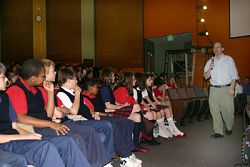Holocaust teaches students justice, responsibility

SALT LAKE CITY — "More than seventy years ago the Nazi German party committed atrocities and unspeakable acts on the Jewish people and others, herding them into ghettos and concentration camps," said Rick Bartman, principal of Judge Memorial Catholic High School. "Those concentration camps are there today. I have been there. I have seen them. "This happened to people your age, people younger, and people older," Bartman told about 350 Judge Memorial students, and seventh and eighth grade students from Blessed Sacrament School. "I made a personal commitment years ago to a survivor when I was at a school in Florida that I would do everything in my individual power to never let anyone within my sphere of influence forget that the Holocaust happened. "It is part of that commitment today that I welcome Erik Ludwig, executive director of the United Jewish Federation of Utah and Rabbi Aron Hier of the Simon Wiesenthal Center in Los Angeles, who came today to show the movie, "I Have Never Forgotten You: The Life and Legacy of Simon Wiesenthal," said Bartman. "I think this might be the most important presentation you will see in your middle school or high school years. "I would appreciate at the end of this presentation if you all personally and individually commit, as the survivors of this horrible time are now almost all gone, that you, who are 12 through 17 years old, never let your sphere of influence forget what happened all those years ago." Ludwig said the United Jewish Federation of Utah has a unique mission, which is to build a bridge between the Jewish and non-Jewish community, between Utah and Israel, and particularly the other Jewish communities around the world. Ludwig explained to the students the film of Wiesenthal’s life was a documentary. He told the students they could watch the film as history which happened a long time ago and as if it was no longer relevant, or they could watch the film and ask themselves why it is still relevant. Ludwig challenged them, because the subject of the Holocaust is difficult to watch, and this particular film was told in an historical fashion. Ludwig asked the students to think about how Wiesenthal’s life story was a story of justice, and asked them think about what justice means to them. He also asked the students to think about how justice matters in their own lives today, and to think about what responsibility means to them. Finally, he asked the students to think about tolerance. "We have talked about the Holocaust," said Ludwig. "For most of us it seems like the Holocaust happened way back in history. But at the same time, we know there is genocide happening in Rwanda and Darfur. Ludwig asked the students to think about what it means to be a more tolerant society?" The movie explains Wiesenthal was born Dec. 31, 1908, in Buczacz, a town in the province of Galicia, now Buchach in Ukraine, in what was then the eastern fringe of the Austro-Hungarian empire. In 1942, the Nazi hierarchy formally decided annihilation was the answer to the "Jewish problem" and Wiesenthal and his family were put into Jewish concentration camps. By September, 1942, most of his and his wife’s relatives were dead; a total of eighty-nine members of both families perished. Wiesenthal weighed less than 100 pounds when he was liberated by the 11th Armored Division of the Third U.S. Army on May 5, 1945. After gaining strength, Wiesenthal tracked hundreds of "Nazi criminals" from his "Jewish Documentation Center" in Vienna. For his work as a prominent "Nazi hunter," he was awarded several honorary degrees and numerous medals, including Germany’s highest decoration. Rabbi Hier said he travels the world showing the movie, and it comes out with one simple message – "Do not live an ordinary, garden variety life. Be whatever you can be. Simon Wiesenthal fought people. He reached low points in his life, he was a fighter, he was determined, he was focused. His life almost broke up his marriage, but in the end, he had even a better marriage. It put strain on his family life, (his house was pipe-bombed, and his daughter’s life was threatened), but he persevered. He was given a gift from God, and all of you have been given your own special talent and your own special chance to find your own personal inner hero. This movie is about becoming everything that you can be. "Do you think it was difficult to be Wiesenthal," Rabbi Hier asked the students, who agreed it was difficult. "I hope you drew certain courage and inspiration from this movie. I hope you feel now that swimming against the current often pays off, but it comes with a heavy price. If somebody feels they have to do something as part of their own self-realization, that it becomes worth it. They do not make movies about ordinary people." Rabbi Hier said this movie is not about any particular religion or race, it is about making your life count and finding the courage within you to stand for whatever values you feel really mean something to you, and only you can do something about. "I urge you to get on the Internet properly and learn how to navigate these very complex geopolitical issues," said Rabbi Hier. "Get your news from good sources, and be savvy people." Prior to the movie the students were uneasy about watching the movie. But following the movie, each was affected in a positive way, and were thinking about the meaning of justice, responsibility, and tolerance.
© Copyright 2025 The Diocese of Salt Lake City. All rights reserved.

Stay Connected With Us